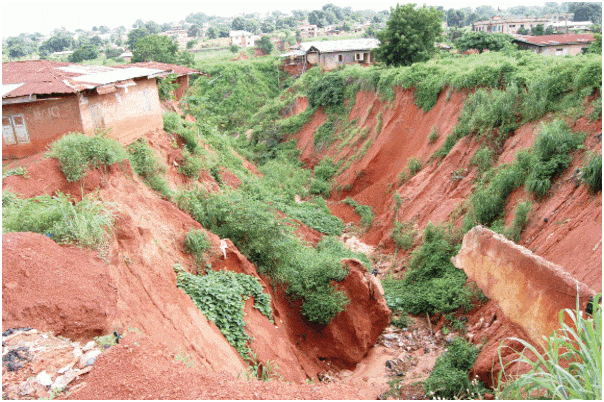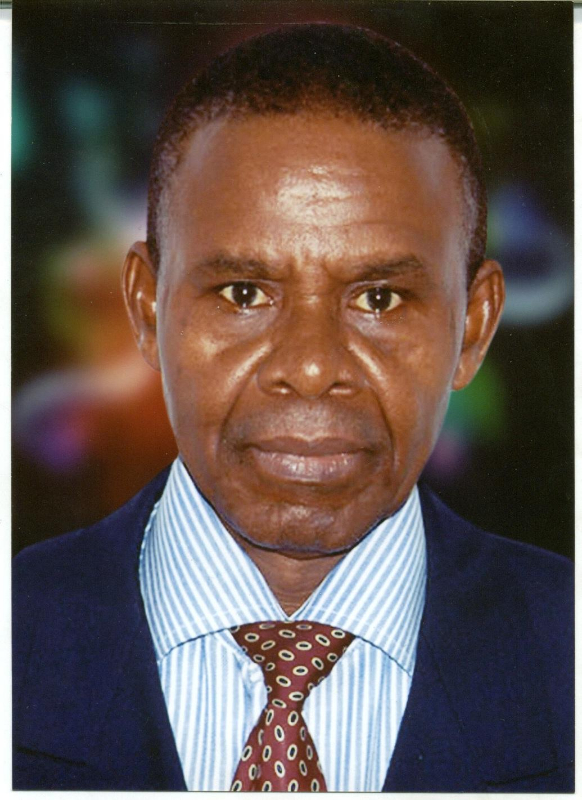
AN EROSION SITE AT IDEMILI AREA OF ANAMBRA STATE
BY CHIMA NWAFO
There is enough evidence to confirm that the average Nigerian is not bothered about ecological issues, including his/her immediate environment: such as residential, business/market, motor-park and office surroundings. Our culture of littering and open defecation has attracted the attention of a United Nations agency. And the details of states and percentage of Nigerians involved is disgusting because, even our metropolitan centres of excellence are not exempted. Equally reprehensible is the fact that despite the human and material costs of environmental degradation in the country, human factors play a major role in such common and livelihood-threatening aspects as flooding, erosion and deforestation. Perhaps, most unfortunate is the veiled uncaring attitude or damning role of governments, from the local to state and federal administrations.
Whereas there is buck-passing between states and the Federal Government in certain areas, states and local councils are to mostly to blame for the disgraceful issue of open defecation. Following our traditional patterns open markets, cities and urban areas build markets, motor-parks and shopping plazas without providing necessary conveniences, which in civilised climes are considered essential before such facilities are opened to the public. Federal highways are no exemption, as none makes provision for convenience.
Flood is as old as rainfall, according to Genesis, the first Book of the Bible. As a result, older nations began early to plan their urban habitations. From my local experience, I recall that Aba township – distinct from Over-Rail, Ogbor Hill, and other surrounding communities – was planned by the colonial masters, just as Yaba, Ebute-Meta and Ikoyi areas of Lagos. All the roads had drainages through which flood waters were channeled. Whenever there’s a heavy down-pour in Lagos, the difference is always clear between those areas planned by colonial administration and the rest. Ditto Enyimba city. So, the incidence of flooding and, to an extent, erosion, is largely caused by failure of the so-called “Town and Regional Planning” departments of states and local governments. In other words, PLANLESSNESS, poor supervision by relevant government officials and corruption in approving building plans are the leading causes of flooding and erosion in Nigeria. In 2012, almost the whole states of the federation experienced flooding. IRIN of October 10, 2012 reported what was described as Nigeria’s worst flooding in over four decades: “Some 1.3 million Nigerians have been displaced and 431 have died in what the authorities say is the worst flooding in over 40 years, with 30 of the country’s 36 states affected since July, according to the National Emergency Management Agency (NEMA). Heavy rain submerged much of Delta and Bayelsa states, affecting some 350 communities and making 120,000 people homeless.

“Flooding started in Plateau State in central Nigeria in July, spread through Borno, Cross River, Ebonyi, Nassarawa, Bauchi, Gombe, Katsina and Kebbi states in August, hit Taraba, Benue, Niger, Kaduna and Kano in September, before affecting Delta and Bayelsa states in September and October.”
That was seven years ago. Has anything changed since then? Not much, if at all, because with rains come same reports of flooding from various parts of the country. Lagos, being a poorly planned coastal town, makes headlines with flooded streets, including Federal highways like the perpetually-expanded Abeokuta Expressway, which a few weeks ago was terribly flooded. On June 6, there was a news headline, “Flood destroys 20 houses, farmlands in Calabar.” Four weeks later, another screaming headline in both print and online media: “Flood submerges 4 communities, renders over 400 homeless in Cross River.” The reasons are not different from points already mentioned.
“Assessing the extent of the damage in parts of Calabar South, the Director-General of Cross River State Emergency Management Agency (SEMA), Mr. Princewill Ayim, said most of the houses affected were erected along the waterways.” Who authorised the buildings?
Some of the affected victims told Daily Sun that it was not a new thing to them, as the flooding has been a perennial incidence, stressing that though they had appealed to government, through letters, to come to their rescue, there was no quick intervention. “Once again, we plead with the government to come to our rescue, as we have suffered for over ten years and have lost our valuables to flood,” a resident, who simply gave his name as John Idong, said.
“We are appealing to the Cross River State Government to help us, they should build a bigger culvert or construct a small bridge along the road so that water can flow freely into the river, a lot of people are suffering as a result of this ugly menace.” The story is the same in other states.

In an interview with the News Agency of Nigeria, on August 27, 2018, Mr Edmund Nkalu, Chairman of Nigerian Society of Engineers (NSE), Awka, Anambra State branch, blamed man-made factors for the devastating effects of erosion menace in the state and the entire South-east. Nkalu said erosion menace in Anambra was caused primarily by the soil type, which was prone to erosion and the topography also increased the speed of run-off water, which had helped the activities of storm water. He, however, said that man-made factors, including indiscriminate construction of buildings, covering of soil surfaces with concrete slabs, out-dated urban designs and poor project supervision were exacerbating the menace.

“There are manmade and natural factors that cause erosion, but the man-made factor is an area that interests us”, said the NSE executive, querying:
“What can we do to reduce and control erosion which occurs as a result of human activities?

“At the individual level, people should design their buildings in such a way that flood water from rain can be absorbed in the soil, instead of these concrete floors which prevent water from percolating into the soil and increase the speed of run-off. It is ignorance that makes people to seal off the floor, unlike in other climes where people only cover the portion for walk-way to the house and leave the other areas green and to absolve the water. Let people begin to plant grass, there is nothing bad in having farm or garden in compounds,” he posited.
Having examined the problem from the man-made perspective, Nkalu who said the society was interested in good governance, which according to him was all about service delivery (by public officers) in every sector of the economy, addressed the real source that has the solution to the menace: the government.
His words: “The Society of Engineers is not comfortable with roads collapsing within two years; we are calling on the supervisory agencies to step up their functions and help check the loss of scarce funds that goes into poor quality jobs. We need a concerted effort of the approval agencies, the physical planning board, the city development agencies, the Ministry of Environment to come up with a master-plan designs.
“Specifications for road designs should be strictly adhered to, there are challenges of paucity of funds which make the contractors to cut corners. The procurement system must be thorough, the material quality must meet standards, the contractor must be competent and the cost of contract must be realistic to be able to build a quality road (with standard drainages).”
Adding another nation-wide costly ecological menace, the National Coordinator, Nigeria Erosion and Watershed Management Project (NEWMAP), Mr Salisu Dahiru, has said that Nigeria ranks the highest with deforestation rate in the world, recording about 450,000 to 600,000 hectares of forest lost annually.
Dahiru who stated this on July 2, 2019 in Benin City, Edo State, while delivering a lecture: “Managing Land Degradation in Nigeria: The Challenges, Action And Remediation”, at the 10th Environmental Outreach Magazine public lecture and environmental awards, “identified population pressure, deforestation, bush-burning, over-grazing, agricultural depletion of soil nutrients through poor farming (methods), inappropriate irrigation and indiscriminate mining as some the causes of land degradation in Nigeria.”
Also at the event, Prof. Lawrence Ezemonye, the Vice-Chancellor, Igbinedion University, Benin and President, Nigeria Environmental Society, regretted that the Institute of Environmental Practitioners Management Bill, sponsored by the society, was yet to receive the President (Muhammadu Buhari’s) assent. He said that the bill would help to ensure that the Nigerian environment was adequately protected, in line with global best practices.
*Nwafo, Veteran Copy Editor/Environmental Analyst, can be reached on: [email protected]; +2348029334754





